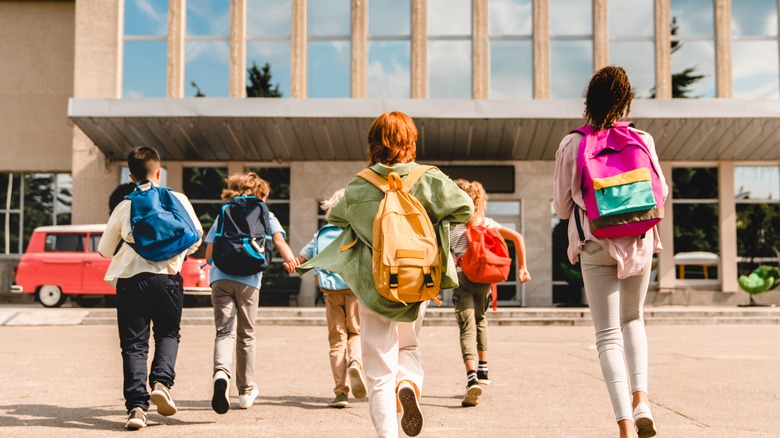Expert Reveals The Prevalence Of COVID-19 In Schools For The Upcoming Year - Exclusive
Back to school is officially here as summer comes to an end. While it's an exciting time for students to get back into the classroom and mingle with classmates, there's one big change this school year – masks aren't required at every school. With COVID-19 regulations scaling back, this has left many parents wondering how COVID will affect this upcoming school year.
"The easing of restrictions simply makes it easier for respiratory viruses to spread in the classroom," explains Richard Martinello, MD, the medical director of infection prevention at Yale New Haven Health, in an expert interview with Health Digest. But infections don't stop there, of course, as students can take them home to family members. "The impact of these viruses can be greatest on the grandparents of these students and others who have underlying health conditions, placing them at increased risk," he notes.
As parents are aware, schools pretty much breed infections. "Kids are naturally social and have less ability than adults (most of the time!) to control their coughing and sneezing, their distance from others, and, overall, ensure they don't spread their germs," explains Dr. Martinello. But what makes matters worse is the classroom size and ventilation, he points out. "Such close quarters, sub-optimally ventilated, increase the risk for the spread of respiratory viruses such as the SARS-CoV-2, which causes COVID," says Dr. Martinello. But take heart, parents, as Dr. Martinello says there are still actions that can be taken to protect your kids and your family.
How can families best prepare for the school year and COVID-19?
During the initial stages of the pandemic, COVID-19 regulations made schools very safe, Dr. Martinello says. "Now, without many of these preventive measures, particularly masking, distancing, testing, and staying home when sick, there is much greater risk for COVID and other respiratory viruses to enter and spread within the classroom," explains Dr. Martinello. This means more kids will get sick from rolling back COVID-19 regulations, he says, and they will miss more school. And besides COVID-19, there are other respiratory infections to stay clear of during the school year. In particular, Dr. Martinello is concerned with influenza, also known as the flu.
With this in mind, there are a couple of ways to safeguard your child's health. According Dr. Martinello, it's important to encourage your child to stay home when they're feeling sick. "Discuss their illness with their physician and discuss when it would be safe for them to get back to school, and whether testing for COVID would help," shares Dr. Martinello. He says it's also important to make sure your child's vaccines are current, especially in regards to COVID-19 and influenza. In addition, Dr. Martinello suggests that parents should encourage their kids to wear a mask while at school, explaining to them that masks are what stop the spread of germs that make us sick.
How can schools best prepare for the school year and COVID-19?
Alternatively, Dr. Martinello explains that schools can also prepare by making sure students, parents, and staff are conscious of health policies and properly following all regulations. "These policies should include how masks are used in school to keep the school community healthy, [and] how students and staff are to stay home when sick and supported to allow them to be out of school when they may be contagious and a risk to others," he advises. This can include sending school work home and allowing sufficient time away from school for illness.
Additionally, he recommends schools focus on optimizing their ventilation systems. In order for this to work properly, Dr. Martinello explains that schools should work with faculty and engineering staff to best achieve the desired results. "Such changes may include upgrading ventilation system filters, increasing fan speeds to push more air, deploying portable HEPA filters in more congested spaces, and even simply having windows open when the weather permits," he suggests.
To learn more, visit the CDC website, or visit Dr. Martinello at Yale Medicine, and Yale New Haven Health.



